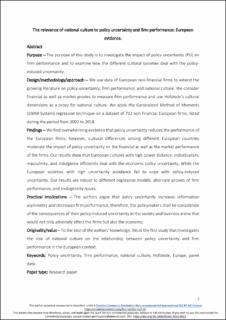| dc.contributor.author | Ahsan, Tanveer | |
| dc.contributor.author | Qureshi, Muhammad Azeem | |
| dc.contributor.author | Gull, Ammar Ali | |
| dc.contributor.author | Muhammad, Fazal | |
| dc.date.accessioned | 2023-05-03T09:52:35Z | |
| dc.date.available | 2023-05-03T09:52:35Z | |
| dc.date.created | 2022-09-08T10:04:16Z | |
| dc.date.issued | 2022 | |
| dc.identifier.issn | 0144-3585 | |
| dc.identifier.uri | https://hdl.handle.net/11250/3065945 | |
| dc.description.abstract | Purpose – The purpose of this study is to investigate the impact of policy uncertainty (PU) on firm performance and to examine how the different cultural societies deal with the policy-induced uncertainty.
Design/methodology/approach – We use data of European non-financial firms to extend the growing literature on policy uncertainty, firm performance, and national culture. We consider financial as well as market proxies to measure firm performance and use Hofstede’s cultural dimensions as a proxy for national culture. We apply the Generalized Method of Moments (GMM-System) regression technique on a dataset of 702 non-financial European firms, listed during the period from 2002 to 2018.
Findings – We find overwhelming evidence that policy uncertainty reduces the performance of the European firms; however, cultural differences among different European countries moderate the impact of policy uncertainty on the financial as well as the market performance of the firms. Our results show that European cultures with high power distance, individualism, masculinity, and indulgence efficiently deal with the economic policy uncertainty. While the European societies with high uncertainty avoidance fail to cope with policy-induced uncertainty. Our results are robust to different regression models, alternate proxies of firm performance, and endogeneity issues.
Practical implications – The authors argue that policy uncertainty increases information asymmetry and decreases firm performance, therefore, the policymakers shall be considerate of the consequences of their policy-induced uncertainty in the society and business arena that would not only adversely affect the firms but also the economy.
Originality/value – To the best of the authors’ knowledge, this is the first study that investigates the role of national culture on the relationship between policy uncertainty and firm performance in the European context. | en_US |
| dc.language.iso | eng | en_US |
| dc.publisher | Emerald | en_US |
| dc.relation.ispartofseries | Journal of economic studies; | |
| dc.rights | Navngivelse-Ikkekommersiell 4.0 Internasjonal | * |
| dc.rights.uri | http://creativecommons.org/licenses/by-nc/4.0/deed.no | * |
| dc.title | The relevance of national culture to policy uncertainty and firm performance: European evidence | en_US |
| dc.type | Peer reviewed | en_US |
| dc.type | Journal article | en_US |
| dc.description.version | acceptedVersion | en_US |
| cristin.ispublished | true | |
| cristin.fulltext | original | |
| cristin.qualitycode | 1 | |
| dc.identifier.doi | http://dx.doi.org/10.1108/JES-01-2022-0012 | |
| dc.identifier.cristin | 2049796 | |
| dc.source.journal | Journal of economic studies | en_US |

